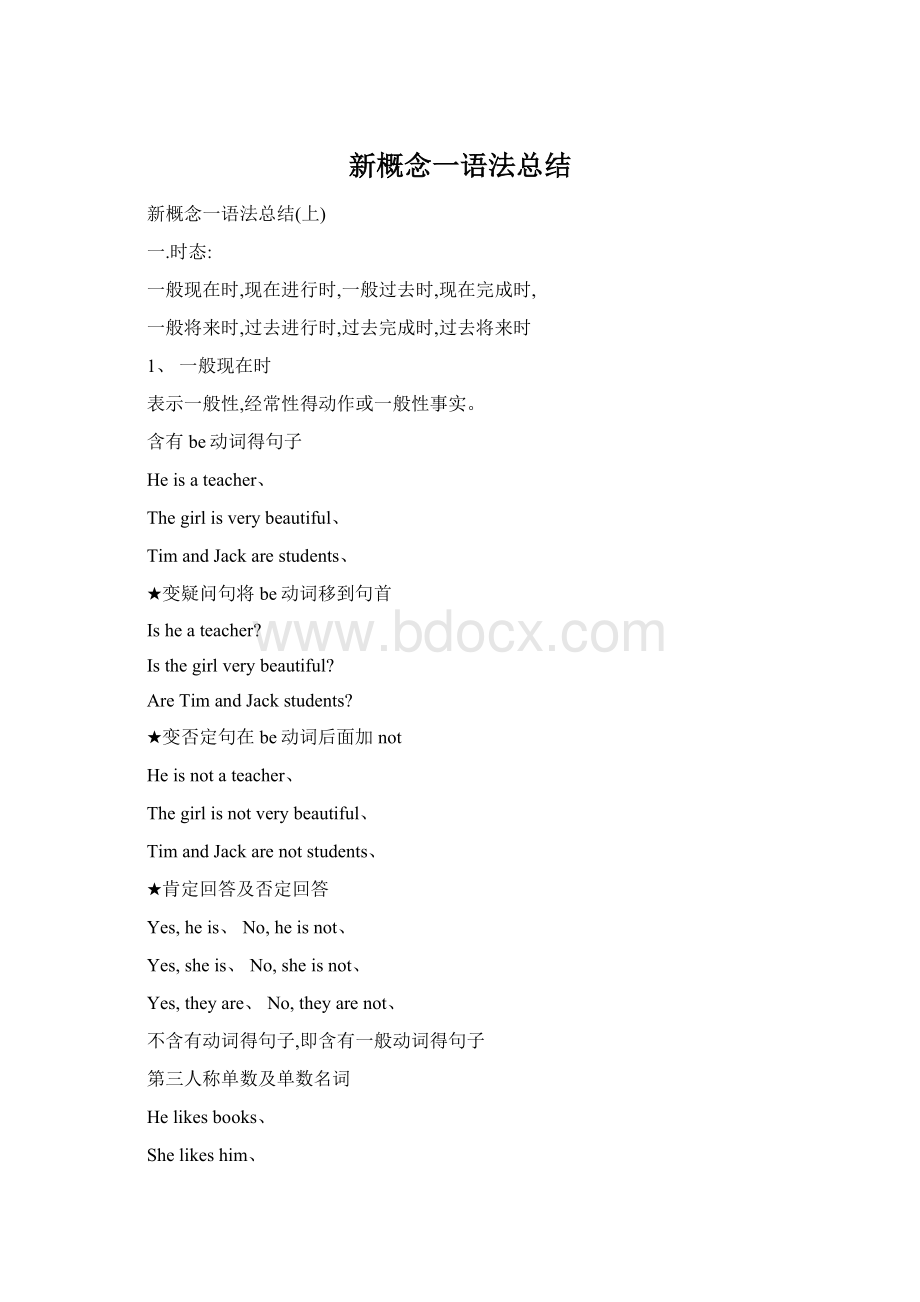新概念一语法总结.docx
《新概念一语法总结.docx》由会员分享,可在线阅读,更多相关《新概念一语法总结.docx(22页珍藏版)》请在冰豆网上搜索。

新概念一语法总结
新概念一语法总结(上)
一.时态:
一般现在时,现在进行时,一般过去时,现在完成时,
一般将来时,过去进行时,过去完成时,过去将来时
1、 一般现在时
表示一般性,经常性得动作或一般性事实。
含有be动词得句子
He is a teacher、
The girl is very beautiful、
Tim and Jack are students、
★变疑问句将be动词移到句首
Is he a teacher?
Is the girl very beautiful?
Are Tim and Jack students?
★变否定句在be动词后面加not
He is not a teacher、
The girl is not very beautiful、
Tim and Jack are not students、
★肯定回答及否定回答
Yes, he is、 No, he is not、
Yes, she is、 No, she is not、
Yes, they are、 No, they are not、
不含有动词得句子,即含有一般动词得句子
第三人称单数及单数名词
He likes books、
She likes him、
The dog likes bones、
★变疑问句在句首加does, 动词变为原型
Does he like books?
Does she like him?
Does the dog like bones?
★变否定句在主语及动词之间加doesn’t, 动词变为原型
He doesn’t like books、
She doesn’t like him、
The dog doesn’t like bones、
★肯定回答及否定回答:
Yes, he does、 No, he doesn’t、
Yes, she does、 No, she doesn’t
Yes, it does、 No, it doesn’t、
注意:
第三人称单数形式一般在动词后面加S,不要与名词复数混淆,变否定句或疑问句时名词复数没有任何变化。
其她人称及复数名词
I want to have a bath、
We have some meat、
The students like smart teachers、
★变疑问句在句首加do
Do you want to have a bath?
Do we have any meat?
Do the students like smart teachers?
★变否定句在主语与动词之间加don’t、
You don’t want to have a bath、
We don’t have any meat、
The students don’t like smart teachers、
★肯定回答及否定回答
Yes, I do、 No, I don’t、
Yes, we do、 No, we don’t
Yes, they do、 No, they don’t、
2、 现在进行时
表示现在正在进行得动作。
构成:
主语+be动词+动词得现在分词+其它成分(现在分词得构成见附录)
We are having lunch、
He is reading a book、
The dog is running after a cat、
The boys are swimming across the river、
★变疑问句将be动词移到句首
Are we having lunch?
Is he reading a book?
Is the dog running after a cat?
Are the boys swimming across the river?
★变否定句在be动词后面加 not
We are not having lunch、
He is not reading a book、
The dog is not running after a cat、
The boys are swimming across the river、
★特殊疑问句:
what, which, how, where, who, etc、
疑问词+动词+主语+现在分词
What are you doing?
What is she doing?
What is the dog doing?
(必背)
没有进行时得动词
表示状态,思想,感情与感觉得动词不能表示正在进行得动作
1、 表示感觉,感官得词
see, hear, like, love, want,
2、 have, has当”拥有”讲时没有进行时
3、 一般过去时
表示过去发生得动作或事件,常与表示过去得时间状语连用,如yesterday, last night, the day before yesterday, 3 days ago,
含有be动词得句子,将动词变为过去式,am, is得过去式为was,are得过去式为were
I was at the butcher’s、
You were a student a year ago、
The teacher was very beautiful ten years ago、
★变疑问句将be动词移动到句首
Were you at the butcher’s?
Were you a student a year ago?
Was the teacher very beautiful ten years ago?
★变否定句在be动词后面加not
I was not at the butcher’s、
You were not a student a year ago、
The teacher was not very beautiful ten years ago、
★肯定回答否定回答
Yes, I was、 No, I was not、
Yes, you were、 No, you were not、
Yes, he/she was、 No, he/she was not、
★特殊疑问句:
What did you do?
(必背)
不含有be动词得句子,将动词变为过去式,动词过去式构成见附录
I finished my homework yesterday、
The boy went to a restaurant、
The Sawyers lived at King Streeta year ago、
King Streeta year ago、
★变疑问句在句首加did,动词变为原型
Did you finish your homework yesterday?
Did the boy go to a restaurant?
Did the Sawyers live at King Streeta year ago?
King Streeta year ago?
★变否定句在主语与动词之间加did not
I did not finish my homework yesterday、
The boy did not go to a restaurant、
The Sawyers did not live at King Streeta year ago、
King Streeta year ago、
★肯定回答及否定回答
Yes, I did、 No, I didn’t、
Yes, he did、 No, he didn’t、
Yes, they did、 No, they did not、
4、 现在完成时
构成:
主语+助动词have, has+过去分词
用法:
1) 表示过去发生得与现在有某种联系得动作,常与just, usually, already, since等时间副词连用
I have just had lunch、 (饱了,不用再吃了)
He has had a cup of tea、(不渴了,不用再喝)
They have already had their holiday、 (不能再度假了)
The boy has already read the book、 (已经知道书得内容了,不用再瞧了)
2)询问别人就是否做过某事一般用现在完成时:
Have you finished your homework?
Have you been to Beijing?
Have he seen the film?
3) 表示开始于过去并持续到现在得动作
I have lived in Beijing for twenty years、
I have worked for this school for 1 year、
4) 表示一种经历,经验:
去过…地方,做过…事情,经历过…事情
I have never had a bath、
I have never seen a film、
I have never been to cinema、
I have ever been to Paris、
Have been to表示去过,have gone to 表示去了
I have been to London、(人已经回来)
He has gone to London、(人还在那里)
5) 表示一种结果, 一般不与时间副词联用
I have lost my pen、
I have hurt myself、
He has bee a teacher、
She has broken my heart、
句型变化:
★变疑问句将助动词移到句首,变否定句在助动词后面加not、
e、g、 Have you lost your pen?
I have not lost my pen、
★肯定回答及否定回答
Yes, I have、 No, I have not、
★特殊疑问句:
What have you done?
What has he done?
一般过去时与现在完成时得区别:
凡就是有明确得表示过去得时间状语得句子为过去时
注意:
有些动词表示得动作有一个终点,不能再延续,因此不能与表示一段时间状语连用
错:
I’ve left Beijing for 3 days、
对:
I left Beijing 3 days ago、 I have been away from being for 3 days、
5、 一般将来时
表示将来将要发生得动作,经常与tomorrow, next year, the day after tomorrow, the year after the next, in five hours’ time, etc、 表示将来得词联用
结构:
主语+助动词will+动词原形
I will go to America tomorrow、
The pilot will fly to Japan the month after the next、
Jack will move into his new house tomorrow morning、
★变疑问句将助动词移到句首
Will you go to America tomorrow?
Will the pilot fly to Japan the month after the next?
Will Jack move into his new house tomorrow morning?
★变否定句在助动词后面加not